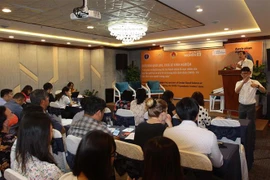 A woman gets financial support from the Government's financial relief package aimed to help vulnerable people overcome difficulties caused by COVID-19. (Photo: VNA)
A woman gets financial support from the Government's financial relief package aimed to help vulnerable people overcome difficulties caused by COVID-19. (Photo: VNA)Hanoi (VNS/VNA) - Vietnam has done well on the Commitment to ReducingInequality Index (CRII), coming second within ASEAN, and ranking 77 out of158 countries this year, according to a new analysis from Oxfam and the DevelopmentFinance International which was released on October 8.
Vietnamis widely acknowledged to have had one of the world’s most successful responsesto COVID-19. It moved rapidly with containment; targeted testing, tracking andquarantine; and public communications. It also included measures to limitincreases in poverty and inequality, a plan on providing financial relief of 2.7billion USD for 20 million vulnerable people, and paying workers whosecontracts were suspended a monthly allowance of 1.8 million VND.
Vietnamis to be congratulated on its recent progress in several areas of policy tofight inequality. Compared to other countries in ASEAN, Vietnam’s performanceis better in terms of health and social protection spending, collecting highlevels of tax, and promoting women’s labour rights, according to the report.
Nevertheless,the findings also show the need to reinforce Vietnamese people-centred policiesto fight inequality in the following ways: increasing the CIT rate and reducingcorporate tax incentives; increasing spending for public services includingeducation, health, and social protection; and increasing its minimum wage to aliving wage, making progress towards universal social protection coverageand access, especially workers in informal and vulnerable employment.
Itis also suggested to move ahead with its adoption of laws allowing independentworkers’ representative organisations in accordance with ILO conventions andcreating an enabling institutional environment for fairer public policy, withcitizens and civil society empowered to participate and provide feedback; andmonitor and reduce inequality as part of poverty reduction.
Theindex ranks 158 governments on their policies on public services, tax andworkers’ rights, three areas pivotal to reducing inequality and weathering theCOVID-19 storm.
Theanalysis reveals that very low spending on public healthcare, weak socialsafety nets and poor labour rights meant the majority of the world’s countrieswere woefully ill-equipped to deal with COVID-19.
TheCRII shows that only 26 out of 158 countries were spending the recommended 15 percentof their budgets on health prior to the pandemic, and in 103 countries at leastone in three workers lacked basic labour rights and protections, like sick pay,when the virus struck.
Theindex highlights that no country in the world was doing enough to tackleinequality prior to the pandemic and while COVID-19 has been a wake-up call forsome, many countries are still failing to act. This is helping to fuel thecrisis and has increased the vulnerability of people living in poverty,especially women.
Women,who generally earn less, save less and hold insecure jobs, have beenparticularly hard hit by the lockdowns introduced in response to the pandemicwhile unpaid care work and gender-based violence have increased dramatically.Nearly half of the world’s countries do not have adequate legislation on sexualassault and 10 countries have no laws on equal pay or gender discrimination./.




























